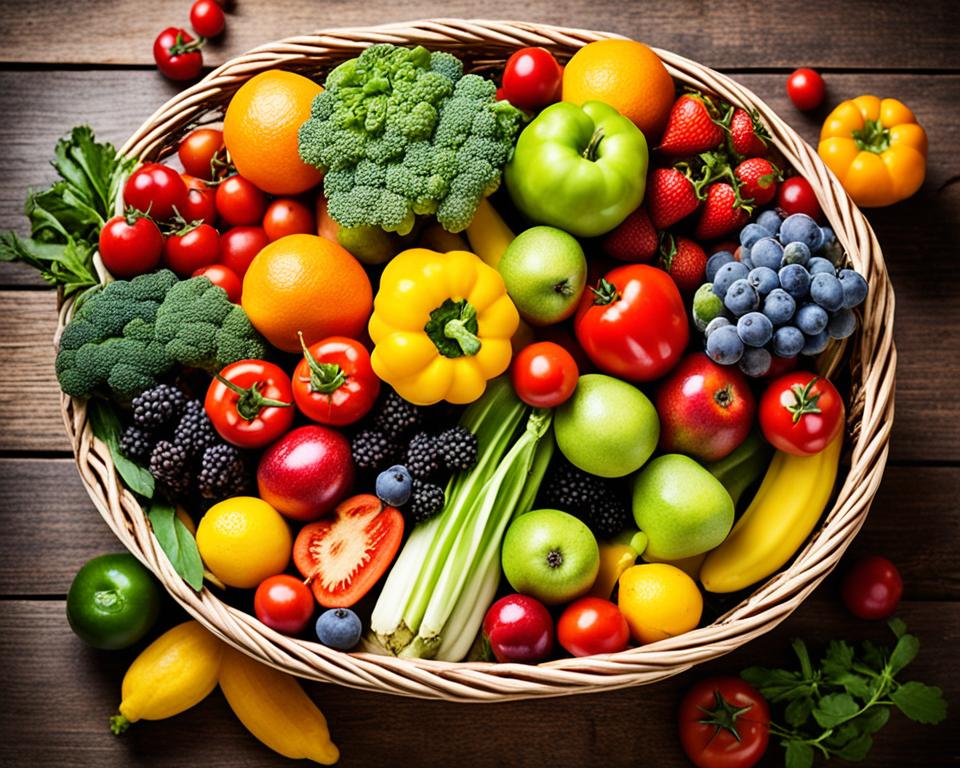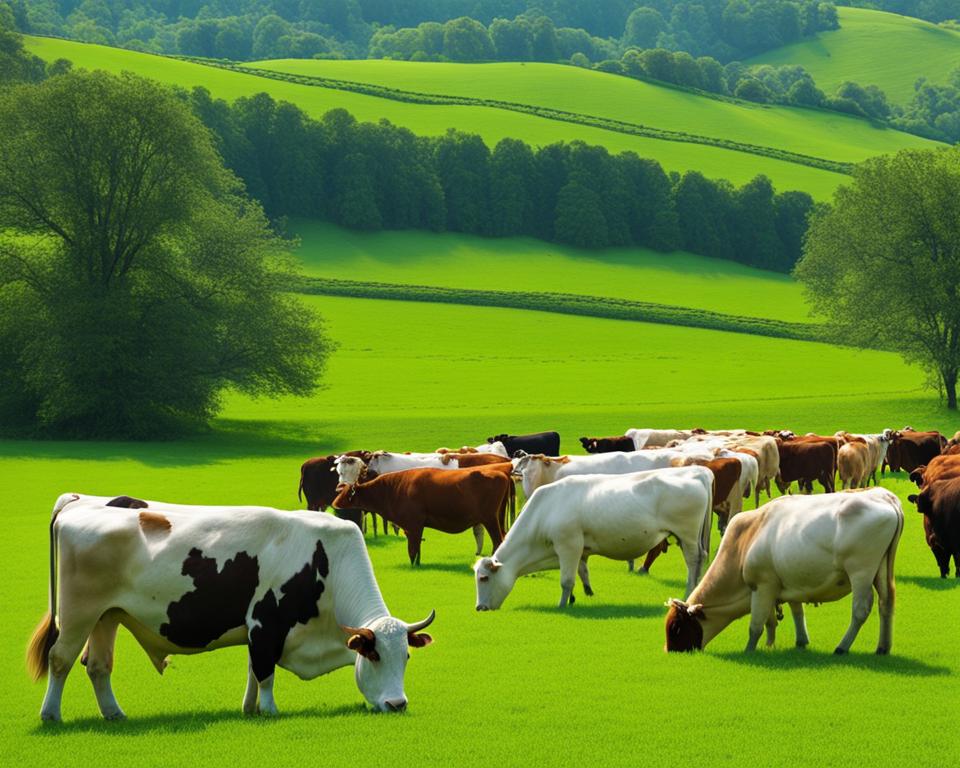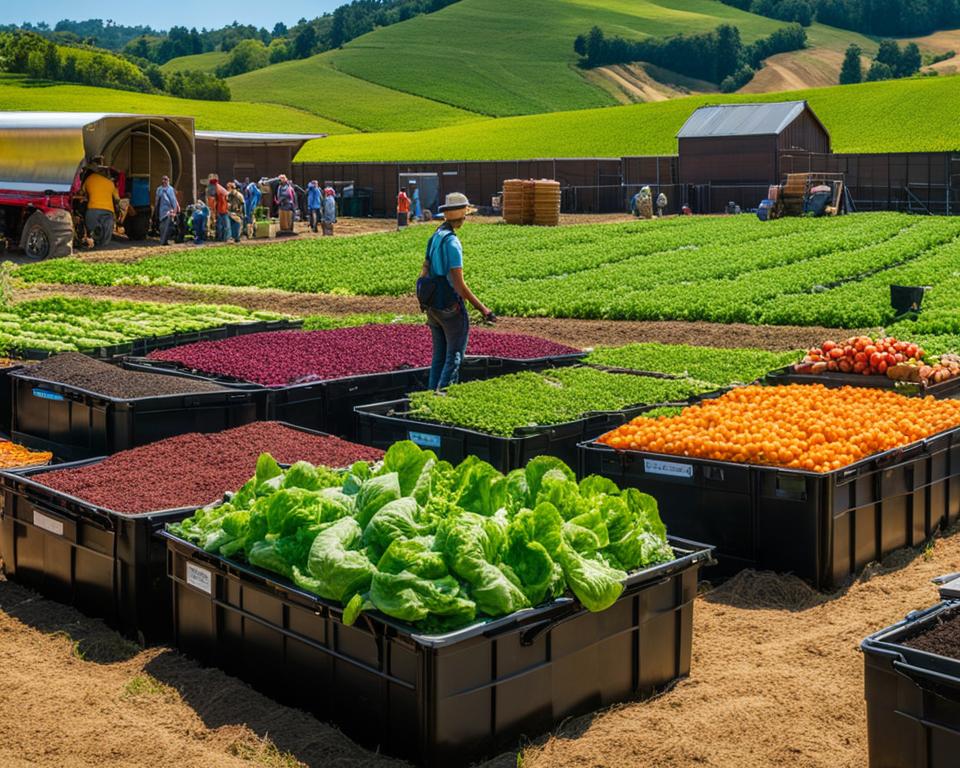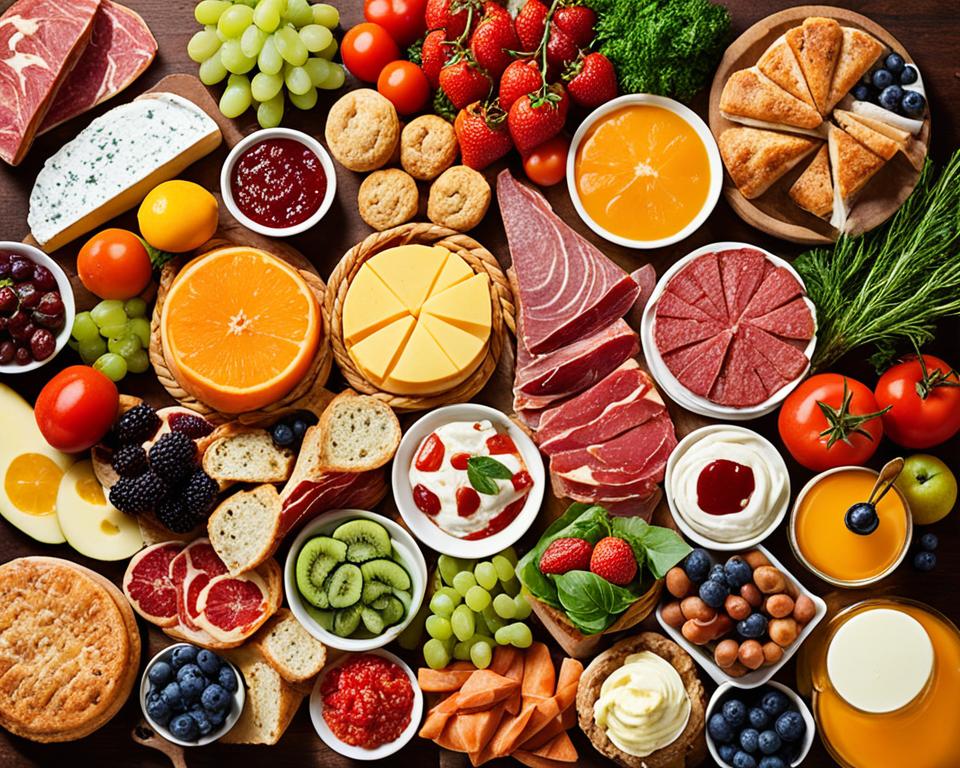As we become more conscious of what we put into our bodies, the conversation about healthy eating and clean eating continues to grow, with sustainable agriculture at its core. We’re here to guide you through the nurturing world of organic foods – nature’s bounty that’s not only kind to our health but also to the planet. Join us in exploring the nutritious food choices that come replete with myriad benefits, as we delve into why organic foods are synonymous with a wholesome lifestyle.
Key Takeaways
- Organic foods champion a healthier living approach by avoiding synthetic herbicides and GMOs.
- They support environmental health through sustainable agriculture.
- Eating organic can contribute to improved mental, emotional, and physical well-being.
- Choosing organic means opting for more nutritious food choices with fewer pesticides.
- Organic livestock are treated with care, resulting in cleaner meat and dairy products.
What Exactly Are Organic Foods?
When we discuss organic foods, we’re referring to more than just a trend; it’s a requisite standard for the health-conscious and environmentally aware. These are natural products nurtured through organic farming techniques, which strictly prohibit the use of synthetic pesticides, artificial fertilizers, and genetically modified organisms (GMOs). At their core, organic foods embody a harmonious relationship with the ecosystem, cultivated to support both our bodily health and the health of our planet.
Here in the United States, the USDA organic certification serves as a beacon for consumers looking to verify the authenticity of their food’s organic status. This certification entails a series of rigorous checks and balances that ensures these foods meet the defined criteria set forth by the United States Department of Agriculture (USDA). Thus, when a product dons the USDA organic seal, it reassures us that what we consume is GMO-free, grown without harmful chemicals, and produced in a way that supports animal welfare and soil health.
- Organic crops: Grown in earth that is treated with organic-only substances, eschewing synthetic additives.
- Livestock care: Animals raised adhering to organic standards enjoy a diet free of non-organic feed and antibiotics, living in conditions that allow for natural behaviors such as grazing.
- Ethical agricultural practices: These farming efforts promote ecological balance, biodiversity, and protect water and soil quality.
The benefits of choosing organic foods extend well beyond the dinner table. They circle back to the earth itself, promoting a cycle of life that’s sustainable, ethical, and beneficial for everyone involved—from the farmer to the consumer, and every living thing between.
Embracing organic means making a conscious decision to partake in an agricultural legacy that prioritizes natural growth processes and the welfare of all living creatures. It’s not merely about what we omit from our products—it’s equally about what we contribute to the ecosystem. So when we talk about organic food, rest assured, it’s a wholesome story that weaves together nature’s well-being with our own.
Contrast Between Organic and Non-Organic Farming Methods
As we examine the sustainable practices behind the food we eat, it becomes increasingly important to highlight the distinctions between organic and non-organic farming methods. Understanding these differences not only informs our choices but also underscores our commitment to environmental stewardship.
Understanding Natural Fertilization and Crop Rotation
In organic farming, synthetic chemicals are a no-go. Instead, natural fertilizers such as compost and manure take the stage, boosting soil health and fertility without the harmful side effects of their synthetic counterparts. Equally crucial is crop rotation, an age-old practice that mitigates pest populations, prevents soil depletion, and maintains the land’s productivity—an embodiment of resilience in farming.
Animal Welfare and Feed in Organic Farming
When it comes to organic livestock practices, there’s a substantial emphasis on the quality of life for farm animals. Organic standards require that animals have access to the outdoors, ensuring they can express natural behaviors. They are fed organic, non-GMO feed and are not subjected to the routine use of antibiotics or growth hormones—a philosophy that respects animal welfare and imparts peace of mind to consumers about the food on their tables.
Environmental Impacts of Organic Farming on Soil and Energy Use
Organic farming methods are powerful allies in the fight against environmental degradation. By increasing soil fertility and avoiding energy-intensive synthetic fertilizers, organic farmers play a pivotal role in carbon sequestration and energy conservation. The resulting effect is a form of agriculture that not only produces nutritious food but also nurtures the planet.
| Aspect | Organic Farming | Non-Organic Farming |
|---|---|---|
| Fertilizers | Natural (compost, manure) | Synthetic chemicals |
| Weed Control | Crop rotation, mulching | Chemical herbicides |
| Pest Control | Natural predators, traps | Synthetic pesticides |
| Soil Health | Improved fertility, reduced erosion | Risk of depletion, increased erosion |
| Animal Welfare | Open ranges, organic feed | Confined spaces, conventional feed |
| Energy Use | Lower reliance on non-renewable energy | Higher energy consumption |
In sum, we advocate for organic farming methods not just for their health benefits, but for the brighter future they promise our planet. It’s a holistic approach that weaves together the threads of nutritious food, ethical animal treatment, and responsible land use into the rich tapestry of sustainable living. This is the essence of environmental stewardship, and it’s something we can all support.
Unveiling the Health Benefits of Organic Produce
Have you ever wondered why we advocate so passionately for organic produce? It’s not just a fad. It’s about embracing the health benefits of clean eating and nurturing our bodies with fresh produce that’s cultivated responsibly. Let’s peel back the leafy layers and explore the potent impact of antioxidants in organic foods and how reduced pesticide use contributes to a healthier, vibrant lifestyle.

The Richness of Antioxidants in Organic Foods
Why do we often hear that organic produce is packed with health benefits? One significant factor is the antioxidants in organic foods. These compounds are essential for combatting free radicals, which can damage cells and lead to chronic diseases. Without synthetic chemicals, organic plants can produce more of their protective compounds, which include these potent antioxidants. In turn, they can offer us better health when we include them in our diets. The belief in clean eating drives us towards these treasures of nature, which can help fortify our immune system and enhance our well-being.
Reducing Exposure to Harmful Pesticides Through Organic Choices
When we choose foods labeled “organic,” we’re taking a significant step toward reducing the pesticides that enter our systems. The USDA organic standards dictate that growers avoid the use of synthetic pesticides, leading to clean, fresh produce that aligns with our body’s natural processes. This means a significant reduction in the toxic load we carry, potentially preventing health issues like allergies and immune disorders. Organic foods are a cornerstone of a lifestyle centered around health and mindfulness.
“Choosing organic isn’t solely about what we eat; it’s about taking a stand for our health and the planet. It’s our commitment to future generations to sustain a world where food is grown to nourish and protect.”
- Rich in antioxidants, organic produce defends against cellular damage.
- Organic choices drastically reduce pesticide exposure, minimizing health risks.
- The philosophy of clean eating emphasizes the purity and potential of our food.
- Fresh organic produce retains nutrients more effectively, enhancing its health benefits.
We’re dedicated to uncovering the true value of organic produce. The gifts of nature await on your plate, and we’re here to share the bounty. By integrating organic choices into our lifestyle, we experience the full spectrum of their health benefits, and we invite you to join us on this journey of discovery and vitality.
Organic Foods’ Freshness and Flavor Profile
Within the world of healthy eating, we have observed a growing appreciation for the vibrant flavor profile of organic foods. Our commitment to ensuring that our meals are made with fresh organic produce isn’t just a matter of preference – it’s about experiencing the full bounty that nature offers. Organic foods are celebrated for their flavor, which many attribute not just to the soil and organic farming methods but to the sheer freshness possible due to less transit time and more direct routes from farm to table.
When we relish that first bite of a succulent, farm-fresh fruit or vegetable, we’re not only enjoying a delicious treat, we’re indulging in the culmination of careful cultivation practices. Organic farmers rely on traditional methods and locally sourced composts that enrich the soil – and ultimately, the produce cultivated within it. The absence of synthetic preservatives means that organic fruits and vegetables arrive in our kitchens brimming with natural goodness, simply as nature intended.
- The proximity of organic farms to our communities often results in produce that celebrates freshness in food – a stark contrast to the long-haul journey that some conventional foods endure.
- Without the need for preservatives to ensure longevity over lengthy transport, organic produce is picked, packed, and sold within a much tighter timeframe, safeguarding its nutritional value and taste.
Below, we’ve outlined a comparison of how fresh organic produce and conventionally grown foods fare when it comes to an aspect pivotal to our dining experience – flavor and freshness:
| Aspect of Freshness | Organic Produce | Conventional Produce |
|---|---|---|
| Transit Time to Market | Shorter, local routes | Often extended, inter-regional travel |
| Use of Preservatives | None, promoting natural freshness | Commonly used for shelf stability |
| Taste Profile | Robust flavors, reflecting natural growth | May have muted flavors due to early harvesting and ripening processes |
| Nutritional Content Retention | Higher, due to minimal processing | Varies, can be diminished through preservation and transit methods |
Ultimately, what sets the flavor profile of organic foods apart is its close-knit connection with the ecosystem. As we advocate for more organic choices in our diets, we’re not just advocating for our health – we’re supporting the local agricultural community and ensuring the sustainability and vitality of our food systems. Truly, savoring the zest of fresh organic produce is a sensory celebration and an ethical choice we can all feel good about.
Sustainable Agriculture: A Pillar of Organic Farming
At the heart of our food system lies a powerful concept that’s reshaping not only how we eat but also how we coexist with our Earth: sustainable agriculture. By integrating organic farming practices, we actively contribute to environmental stewardship. These practices are not just gentle on the Earth; they’re part of a systemic shift toward greater respect for our natural resources.
As champions of this movement, we have witnessed first-hand how this transformation in agriculture nourishes not only our bodies but the planet’s ecosystems. It is our privilege and responsibility to share with you the profound effects sustainable agriculture has on conserving our water sources, preventing soil erosion, and fostering a self-reliant, eco-friendly farming economy.
Organic Farming Practices and Their Role in Environmental Stewardship
It is through the adherence to organic farming principles that we see true environmental stewardship in action. These principles encourage the use of natural composts and forbid the application of synthetic chemicals, allowing us to maintain biodiversity and ensure the long-term viability of our agricultural lands. By fostering soil health and reducing dependency on non-renewable resources, organic farmers are at the forefront of a global movement toward sustainable living.
Conservation of Water and Preventing Soil Erosion
Another cornerstone of sustainable agriculture is the judicious use of one of our most precious resources: water. Water conservation measures in organic farming include innovative techniques like drip irrigation and mulching. These techniques not only save water but also prevent soil erosion, safeguarding our topsoil from being washed or blown away, ensuring that future generations have fertile ground to farm.
“Through the nurturing hands of organic farming, we cultivate more than crops; we foster a world that thrives on sustainability and mindful living.”
- The emphasis on crop diversity and rotation protects water bodies from agrichemical run-off and preserves aquatic life.
- Natural pest control methods minimize water pollution, contributing to healthier drinking water sources for our communities.
To us, organic farming is more than an occupation. It’s a pledge to uphold the values of environmental stewardship and ensure that our agricultural practices promote a sustainable and prosperous future for all.
The Nutritional Superiority of Organically Raised Livestock
When we explore the alimentary choices available to us, we are often swayed by the promise of enhanced nutrition and ethical farming practices. In our pursuit, we’ve discovered that **nutritionally superior organic meat**, **organic milk**, and **organic eggs** stand out for their health benefits. The organic label goes beyond just a farming method; it signals to us a product of a **sustainable livestock farming** system where animals are provided with organically grown feed and more natural living conditions. These practices are instrumental in nurturing not just the livestock but also the quality and nutritional content of the products they yield.

It is worth highlighting the critical nutritional advancements found in **organic meat** and dairy. Studies have shown that the absence of antibiotics, growth hormones, and genetically modified organisms in the animals’ diet results in products with notably higher levels of certain nutrients, such as omega-3 fatty acids. Indeed, omega-3s are up to 50 percent higher in **organic milk** and meat when contrasted with their conventionally raised counterparts. The implications of this are far-reaching, offering us **healthy dietary options** with potential health benefits that are hard to overlook.
Opting for organically raised livestock is not just a healthful choice, but a commitment to a more humane and responsible food system.
Let’s take a closer look at this comparison:
| Nutrient | Organically Raised Livestock | Conventional Livestock |
|---|---|---|
| Omega-3 fatty acids | Up to 50% higher levels | Lower levels due to conventional feed |
| Antibiotic residues | None, as antibiotics are not routinely used | Possible presence due to preventive use |
| Growth Hormones | None, as growth hormones are prohibited | Often used to accelerate growth |
| GMOs in feed | None, exclusively organic feed | Common, as GMO feed is prevalent |
It is our belief that by embracing organic eggs, milk, and meat, we’re not just nourishing our bodies with high-quality nutrients; we’re also contributing to a more sustainable and ecologically balanced world. Our collective choice to support **sustainable livestock farming** means nurturing a food ecosystem that respects the natural world and provides us with **healthy dietary options** that are as pure as they are flavorful.
- The ethical treatment of animals in the organic farming sector contributes to a more nurturing and stress-free environment, which is fundamental to the quality of produce.
- Organic standards ensure the absence of harmful chemicals and unnatural additives in the animals’ diet, yielding products that are cleaner and more natural.
- By choosing organic, we not only enhance our health but also advocate for an agricultural practice that is sustainable and kinder to our planet.
Through our continued support for organic products, we can foster positive changes in both our health and the environment. As we set our tables with **nutritionally superior organic meat**, milk, and eggs, we’re also setting a global table of kindness, quality, and sustainability – values that are indispensable in our quest for a healthier and more ethical world.
Debunking Myths: Organic Foods and GMOs
As we navigate the seas of modern food choices, one beacon of certainty is the world of organic foods GMO-free. Anchored by a commitment to naturally occurring elements of the earth, organic standards reflect a genuine respect for the integrity of our food sources. In this section, we aim to shed light on the complexities of genetically modified organisms and provide an evidence-based analysis that discerns fact from fiction with respect to the foods we consume.
Understanding Genetically Modified Organisms
When considering understanding GMOs, it’s critical to first clarify what they truly are. GMOs are organisms—plants or animals—whose genetic makeup has been altered through biotechnology. For some, this presents a horizon of potential; for others, it’s a red flag. Organic standards, however, uphold a fundamental principle: the exclusion of genetically engineered components to sustain the natural state and robustness of non-engineered foods.
Evidence-Based Analysis of GMOs in Conventional Foods
Our journey towards transparency in food production has led us to an imperative crossroad: evidence-based analysis of GMOs’ use in conventional foods. There has been mounting concern from health advocates and consumers alike regarding the impact of GMOs on health and the environment. While the debate continues, with some studies suggesting potential risks like increased allergens or organ damage, organic certification stands as a guardian against such uncertainties in our diet. It guarantees that what we’re eating is free from genetic modification—an assurance for those prioritizing organic foods GMO-free.
We, as part of the community that values the wholesomeness of food, hold dear the guarantee that comes with organic labels. They serve not just as markers of quality but as emblems of our adherence to practices that exclude GMOs in favor of a pure, undistorted bounty from earth to table. Choosing organic is akin to saying yes to food in its most original form, without the interference of genetic technology.
In our health-conscious and environmentally committed society, we find solace in organic farms’ fortitude against the wave of genetic modification. Their steadfast dedication to all that is unaltered and naturally rooted provides a sanctuary for the eco-savvy consumer. Empowering ourselves with the knowledge of what constitutes true organic produce and the implications of GMOs allows us to navigate the complex world of food choices with confidence.
We stand beside you on this voyage of understanding, sharing insights and dispelling myths about GMOs and organic produce. Together, we champion a diet that is rooted in nature, is nurturing to our bodies, and is sustainable for our world. It’s our pledge to continue advocating for natural, GMO-free organic food, not only for our physical health but for the integrity of our planet’s ecosystems.
The Co-relation Between Organic Food and Mental Health
In recent years, a fascinating body of research has emerged, vividly illustrating the co-relation between organic food benefits and mental health correlation. It’s becoming increasingly clear that there’s a significant connection between the foods we consume and our overall emotional well-being. Organic foods, grown without synthetic pesticides and rich in nutrients, play a pivotal role in this dynamic, particularly through the lens of clean eating impact.
But what exactly connects organic fare to our mind’s health? Studies are now hinting at the possibility that organic diets could lead to improved mental states due to their lower pesticide content and heightened nutrient levels. These benefits of organic food are not lost on those who experience them, often reporting a sense of enhanced mood and emotional stability.
By indulging in the purity of organic food, we may be unknowingly supporting not just our physical health, but our mental and emotional landscapes as well.
The intuitive practice of clean eating—choosing foods as close to their natural state as possible—has long been associated with physical health benefits. However, we’re now understanding that this impact extends into the realm of mental clarity and mood enhancement. Let’s not forget, our gut is often labeled the “second brain” due to its proven influence on mental health, an influence that is nurtured by a diet comprising organic, nutrient-rich foods.
The harmonious relationship between the earth and the produce it gives transcends a simple nutrient exchange. Sustainable agricultural practices bring forth produce that is intrinsically linked to our holistic health. The relationship between the soil, plant, and consumer is intimate; a balanced, nurtured earth yields fruits and vegetables, which in turn nurture us.
- Eating organic may lower exposure to toxins traditionally used in agriculture, potentially leading to better psychological health.
- Nutrient-dense organic produce can contribute to the fortification of our mental faculties.
- The commitment to supporting sustainable practices through organic purchases also instills a sense of emotional well-being, knowing we are contributing positively to our planet.
As we forge ahead in our journey of understanding, it’s vital to continue exploring the myriad ways in which our choices at the market affect not only our personal health but the health of our communities and our planet. By opting for organic, we’re not just making a decision for the here and now; we’re investing in a sustainable model of health that reverberates into all aspects of life.
Indeed, as we walk through fields of organic agriculture, we may very well be strolling through the future of mental health care—an era where clean eating and clarity of mind go hand in hand, nourished by the bounties of an earth that is loved, respected, and cared for. Let’s continue to choose organic, for the good of our stomachs, our minds, and our world.
Local vs Organic: Making Informed Choices
When deciding what to bring to our tables, the debate of local vs organic surfaces with compelling points on each side. It’s essential to understand the nuances and implications of each choice to make informed decisions that align with our dietary preferences and values. We believe it’s not just about the label; it’s about the story behind the food that graces our plates.
Economic Benefits of Locally Sourced Organic Foods
Delving into the realm of locally sourced organic foods unearths significant economic benefits. Firstly, purchasing from local organic farmers strengthens the local economy, ensuring that our money directly supports the people and the land within our community. Here’s how embracing local organic produce can lead to economic prosperity:
- It generates local employment, fostering community growth and resilience.
- By cutting out the middleman, more of the consumer’s dollar goes straight to the farmers.
- Local organic agriculture can contribute to regional food sovereignty and reduce dependency on distant markets.
Assessing Food Miles and Its Environmental Relevance
The discussion surrounding food miles and their environmental impact is an integral part of this conversation. By understanding the distance our food travels from farm to fork, we can start to appreciate the carbon footprint associated with our food choices. Here’s how local and organic options weigh in:

| Aspect | Local Organic Foods | Conventional Non-Local Foods |
|---|---|---|
| Food Miles | Lower due to proximity of farms to markets | Higher due to long-distance transportation |
| Carbon Footprint | Reduced greenhouse gas emissions | Increased emissions from transport |
| Freshness | Peak freshness with minimal transport time | May decline due to preservatives and travel time |
| Investment in Community | Reinforces local economies and infrastructure | Diverts potential economic benefits to other regions or countries |
However, we acknowledge that not every local farmer can afford organic certification despite potentially using organic methods. It’s crucial for us, as conscientious consumers, to engage with local growers and understand their farming practices, creating a transparent and trust-based food network.
Ultimately, our choice to prioritize locally sourced organic foods is an expression of our commitment to sustainability and community well-being. We advocate for a food system where economic vitality, environmental health, and social equity coalesce, nurturing a nourished and flourishing society.
The Truth About Pesticides in Organic Farming
Delving into the practices of organic farming, we often encounter the myth that organic means completely pesticide-free. This is a common misunderstanding. Organic farming does indeed use pest control measures, but it crucially differs from conventional methods in its careful selection of natural pesticides. These substances derive from natural sources rather than being synthetically produced, which aligns with the ethos of reducing chemical exposure and promoting healthy eating.
The use of pesticides in organic farming is carefully regulated to ensure that they meet stringent safety standards. The move towards natural pest control practices lessens the number of harmful chemicals that make their way into our food supply and, subsequently, into our bodies. This approach contributes significantly to a lower “chemical body burden”, potentially reducing the risk of certain health issues that have been associated with synthetic pesticides.
By advocating for and consuming organic produce, we collectively support methods that foster our well-being and that of the environment.
We’re not simply making arbitrary choices in the supermarket; we’re actively taking steps towards healthy eating habits by preferring foods with a cleaner pesticide profile. The following table presents some of the natural pesticides used in organic farming, emphasizing our commitment to a healthier lifestyle:
| Natural Pesticides | Derived From | Commonly Used Against |
|---|---|---|
| Pyrethrin | Chrysanthemum flowers | Insects like aphids and beetles |
| Neem oil | Neem tree | Various pests including mites and moths |
| Spinosad | Soil bacterium Saccharopolyspora spinosa | Caterpillars, thrips, and beetles |
| Sulfur | Naturally occurring mineral | Fungi and mites |
| Rotenone | Roots of subtropical plants | Used sparingly for insects and fish |
Understanding the substances used in pesticides in organic farming underlines the importance of choices we make for our health and for the earth. It’s a testament to how we, as consumers, have the power to influence agricultural practices through our demand for products cultivated with natural pesticides and a commitment to reducing chemical exposure. Ultimately, this is more than a trend – it’s a profound move towards a healthier future for all.
Maximizing Your Investment in Organic Foods
Embracing a diet abundant in organic foods is a splendid commitment to your health and the environment. However, we’re acutely aware that keeping organic purchases budget-friendly can be a challenge. That’s why we’re here to share some smart organic shopping strategies that can help you in maximizing your organic investment without compromising the principal of consuming healthy, clean food.
Strategies for Buying Organic on a Budget
When it comes to organic on a budget, it’s all about making savvy choices that balance cost with the benefits of organic produce. Here are a few purchase strategies we’ve adopted to ensure our hard-earned money is well spent:
- First, we prioritize our purchases. We keep a close eye on the Environmental Working Group’s “Dirty Dozen” list to identify which produce we’ll always buy organic.
- Shopping at local farmer’s markets can then size down the expense, as produce is often fresher and more affordable direct from the source.
- We also consider buying organic in bulk to save on cost per unit, which is particularly useful for non-perishable items or produce we consume frequently.
- Moreover, we keep an eye out for sales and discounts on organic products at our favorite retailers and consider store brands for a more economical option.
Identifying Priority Food Items to Purchase Organic
Smart organic shopping isn’t just about looking for deals; it’s also about understanding where your organic dollar counts the most. Here’s a priority list to help you navigate those essential organic purchases:
| Food Item | Reason to Buy Organic |
|---|---|
| Apples | Typically high in pesticide residue when conventionally grown |
| Bell Peppers | Conventional peppers can contain a variety of pesticides |
| Spinach | Often heavily treated with synthetic pesticides in non-organic farming |
| Celery | Has a thin skin, which doesn’t offer much protection from pesticides |
| Potatoes | Root vegetables like potatoes may absorb more pesticides from soil |
Conversely, items like avocados and sweet corn, which appear on the “Clean Fifteen” list, are considered lower priority for organic purchase.
Mindful shopping and prioritizing keeps the spirit of organic living vibrant and feasible. We find peace in knowing that every organic item chosen is a step towards a healthier life and a healthier planet. Together, we can embrace the journey of maximizing organic investment and enjoying priority organic food items daily.
Organic Certification and Labeling: What to Look For
In today’s health-conscious market, consumer awareness about the source and quality of the food we eat has led many to seek out organic certification. These certifications, particularly the well-known USDA organic labeling, serve as a guidepost for those wishing to consume products that adhere to federally-mandated organic standards. Understanding what these labels mean can empower us to make informed decisions about the foods we choose for ourselves and our families.
Breaking Down USDA Organic Certification Requirements
The USDA organic seal is a widely recognized symbol that signifies compliance with the National Organic Program’s organic standards. Products that display this seal are verified by an authorized certifying agent and are produced without genetic engineering, ionizing radiation, or sewage sludge. They also adhere to specific food packaging guidelines that dictate the use of the USDA organic logo on products. To qualify for this designation, products must contain at least 95% organic ingredients.
Interpreting Organic Labels on Food Packaging
Organic food packaging can carry various labels that indicate the level of organic content. The main labels you’ll encounter include:
- 100% Organic: This label indicates that every ingredient in the product (except water and salt) is certified organic.
- Organic: At least 95% of the ingredients are organic, with the remaining ingredients being non-organic but approved by the USDA.
- Made with Organic Ingredients: These products contain at least 70% organic ingredients, with the remainder consisting of non-organic USDA-approved items.
Products with less than 70% organic content may list the organic items in the ingredient panel, but cannot use the term ‘organic’ on their main packaging. Familiarity with these classifications helps us navigate the supermarket aisles with confidence, ensuring we support our health and the environment through our purchasing choices.
Conclusion
Throughout our comprehensive exploration of organic foods, we’ve unearthed the undeniable virtue that accompanies a GMO-free diet. It’s more than just a trend; it’s a testament to our dedication to healthy eating habits and an environmentally conscious choice that resonates with the rhythmic pulse of the earth. The rich tapestry of benefits we’ve discussed showcases the profound impact that organic foods have on our well-being and underscores the importance of sustaining a sustainable lifestyle.
We realize the path towards fully embracing organic consumption can be strewn with obstacles, such as higher costs and varying accessibility. Nonetheless, we remain steadfast in our belief that through educated decisions and an awareness of organic labeling, we can navigate these hurdles. By doing so, we make proactive choices, not just for our own health, but for the health of this brilliant planet we call home. Advocating for and adopting a lifestyle that upholds the purity of organics is an investment in our future—a future that is cleaner, safer, and greener for all.
In conclusion, our collective journey towards integrating organic foods into our lives is an act of conscious living, where each organic selection echoes our commitment to the environment and a healthier society. As we continue to support sustainable agriculture and conscientiously choose GMO-free and organically certified products, we forge a world where health and the environment dance in harmony. This isn’t an end; it’s just the beginning of our ongoing pursuit to cultivate a more sustainable lifestyle brimming with vitality and environmental integrity.
FAQ
What Exactly Are Organic Foods?
Organic foods are products grown and processed without the use of synthetic pesticides, fertilizers, genetically modified organisms (GMOs), antibiotics, or growth hormones. They adhere to strict standards set by the USDA Organic Certification program, which aims to promote sustainable agriculture and environmental stewardship.
What Are the Differences Between Organic and Non-Organic Farming Methods?
Organic farming methods focus on natural fertilization, crop rotation, and using organic feed for livestock. It avoids synthetic chemicals and GMOs, often leading to environmental benefits like improved soil health and energy conservation. Non-organic farming relies more on synthetic inputs and conventional practices that can be less sustainable.
How Do Organic Farming Practices Benefit the Environment?
Organic farming practices protect the environment through methods such as natural pest control, water conservation, and preventing soil erosion. These practices encourage biodiversity, reduce pollution, and support a self-sustaining cycle of resources, reflecting responsible environmental stewardship.
What Health Benefits Can I Expect from Eating Organic Produce?
Eating organic produce can lead to several health benefits, including a higher intake of antioxidants and nutrients, a lower risk of pesticide exposure, and potentially reduced risks of allergies, cancer, and other health issues. It supports a clean eating lifestyle which can contribute to overall better health.
Why Is Organic Produce Often Considered Fresher and Tastier?
Organic produce is often fresher due to the lack of preservatives, which allows it to be sold closer to its harvest time. Also, the sustainable farming techniques used can result in a superior flavor profile compared to conventionally grown produce.
Are Organically Raised Livestock Healthier Than Conventionally Raised Ones?
Yes, organically raised livestock are given organic feed, more space, and are free from synthetic hormones and antibiotics. This humane treatment not only benefits the animals but may also result in meat and dairy products that are richer in certain nutrients such as omega-3 fatty acids.
What Are GMOs, and Are They Used in Organic Foods?
GMOs, or genetically modified organisms, are plants or animals that have had their genetic makeup altered through engineering techniques. Organic standards prohibit the use of GMOs, so consumers can trust that organic foods are GMO-free.
Can Organic Food Consumption Affect Mental Health?
Some evidence suggests that the reduced pesticide content and higher nutrient levels in organic foods may have a positive impact on mental and emotional health. However, more research is needed to fully understand this correlation.
Should I Choose Local or Organic Foods?
The decision depends on personal priorities. Locally sourced organic foods support the local economy and can offer fresher options with a smaller carbon footprint due to reduced transportation. However, not all local farming is organic, so it’s important to understand the farming practices involved.
Do Organic Farms Use Pesticides?
Organic farms do use pesticides, but they are derived from natural sources rather than synthetic ones. This can result in lower levels of chemical exposure compared to conventional farming practices.
How Can I Afford an Organic Diet?
Strategically purchasing organic foods by focusing on those with the highest pesticide residues when conventionally cultivated, like the “Dirty Dozen,” and considering less critical organic purchases for the “Clean Fifteen” can help manage costs. Watching for sales and buying in bulk can also make organic eating more affordable.
What Does Organic Certification Mean, and How Should I Read Labels?
Organic certification ensures that the product complies with USDA organic standards. Reading labels is crucial, with “100% Organic” indicating full compliance, “organic” signifying at least 95% organic content, and “Made with organic” meaning at least 70% organic ingredients. Understanding these labels helps consumers make informed choices.





